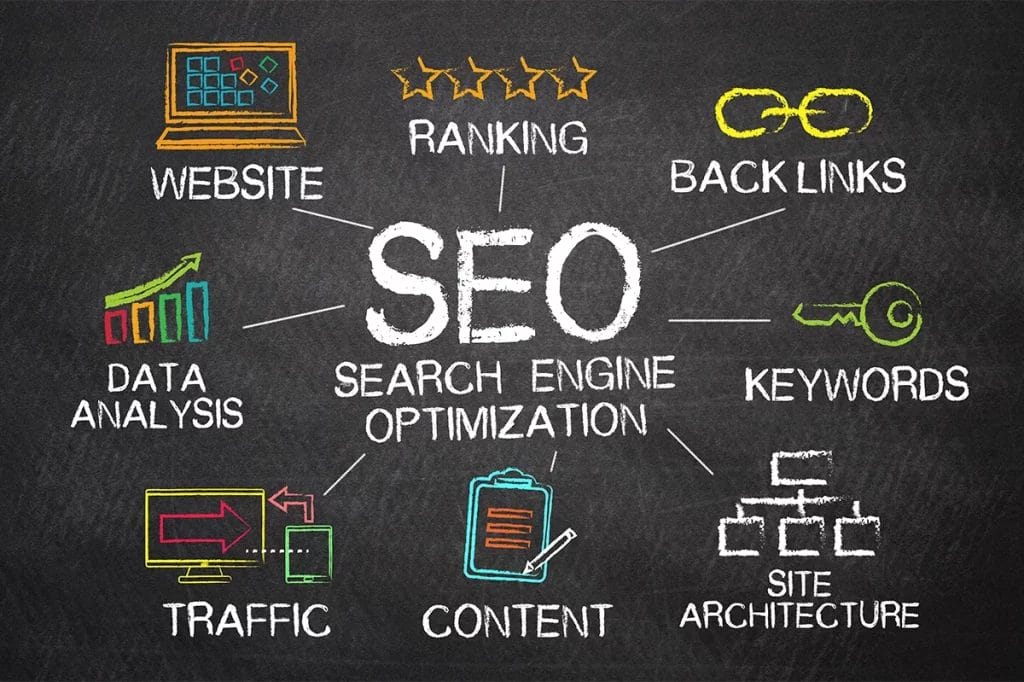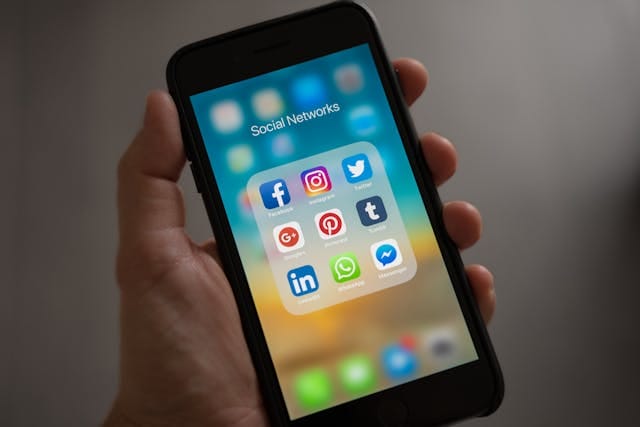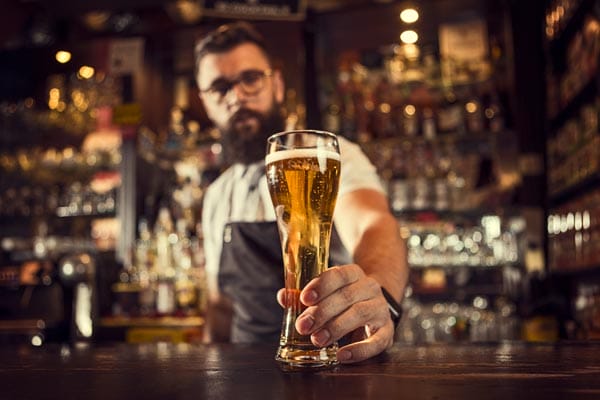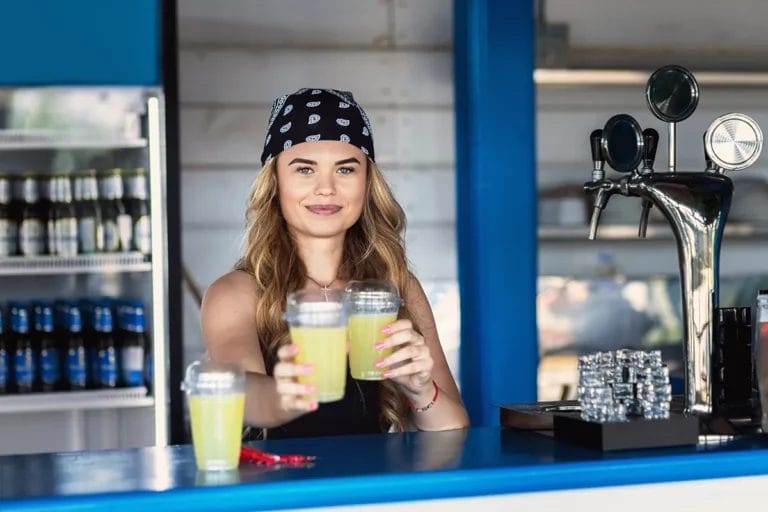In an industry full of talented people, your competition is stiffer than the drinks you pour.
Being an amazing mixologist is only half the battle when it comes to running a mobile bartending business. You need to master your marketing skills if you want to stand out and build your client list.
From tried-and-true bar marketing strategies to killer content plans, we’re here to help you get set for success and build a business you can be proud of.
Get Your Free Content Plan Template
What to Include in Your Mobile Bar Marketing Plan
No matter where you are in your bar business journey, marketing should be at the top of your to-do list. The best way to grow your business is to get your name out there and show potential clients what you can do.
An Effective Website
98% of consumers search for local businesses online.
If you don’t have a website, you’re missing out on one of the best opportunities to reach potential customers. You can create a site that draws new business and provides an easy way for clients to contact you.
Find a Site Builder
Luckily, it’s easier than ever to create a successful website, even if you don’t know how to code or have experience in web design. There are plenty of free or inexpensive services that offer user-friendly design tools and apps for online bookings, payment processing, and more:
- Wix: Intuitive drag-and-drop interface, hundreds of templates, large app marketplace and tons of integrations, free option
- Hostinger: Affordable, uses AI to build a site in minutes on a custom domain, easy-to-integrate booking and payment processing tools
- Ucraft: Collaborative editing, mobile-friendly, free (limited) option

Choose and Register Your Domain
In most cases, you can research and purchase a domain through your chosen site builder. If you prefer to buy it separately, head to a registrar site — like Cloudflare or the very budget-friendly Namecheap — to see if it’s available and secure it.
Your URL should be the same or very similar to your bartending business name so that clients can find you easily. Avoid adding extra characters that might confuse people.
Design Your Website
Every mobile bartending business website needs at least four key pages (or sections if you’re planning to have a 1-page website):
- Homepage: Your home page should feature a quick explanation of what you do, some images to showcase your talents, links to important pages, and testimonials. If you offer online booking, include a direct link to your booking page or app, too!
- Services: Provide a menu of bartending services and prices showing your main offerings as well as any customizations your customer can request. This sets clear expectations and often answers the most common questions.
- Contact: Give clients a way to contact you, inquire about your availability, request a custom quote, and ask questions. A simple email contact form works well, and it’s also a great place to link to your booking tools.
- About: Introduce yourself and your business to show them who they’ll be working with. Share information about your background, experience, and specialties, plus a few professional pictures to put a face to the business.
This covers the most important information prospective customers will want to know with a relatively small amount of work and prep on your end.
To take your site a step further, you can also include additional pages to enhance the customer experience and increase traffic:
- Blog
- Contract example
- Business policies
- Photo/video gallery
- Testimonials and reviews
- FAQs
These pages give you more opportunities to show off what you can do and provide additional resources for your clients. Plus, expanding your content gives you more space to optimize your site.

SEO for Mobile Bar Marketing
Search engine optimization (SEO) is a digital marketing method that improves your website’s visibility in online search engines.
By incorporating helpful, original content on your site that exactly matches what your customers are searching for, you can improve your chances of appearing higher in search results when potential clients are looking for a mobile bartender.
You don’t need to be a professional digital marketer to achieve SEO results, particularly when targeting a local market. All you need to do is get into the mind of your target audience. What kind of terms would somebody search when looking for a mobile bartender?
Keyword research tools help take the guesswork out of the process, providing high-quality keyword ideas for your content. Check out Semrush’s Keyword Magic Tool or Backlinko.
Once you have a list of terms, use them throughout the content on your site to help search engines know that your business fits the intent of whoever searches those keywords.

Quick Website Tips
- Share your website everywhere: business cards, social media, emails, invoices, and advertising
- Ask satisfied customers if they’d be willing to give testimonials for you to post on your site
- Track performance metrics for your site through your site builder’s internal analytics tools to help improve traffic and leads
Key Takeaway
Taking the time to set up an effective website can have a big payoff for your business. Once your site is up and running, you can reach a wider pool of potential clients and you have a resource for your existing customers.

(The Right) Social Media Presence
Users spend a total of 11.5 billion hours per day on social media. If you want to raise brand awareness and expand your reach, social media is the place to be.
Best Platforms for Mobile Bartenders
With so many platforms out there, choosing the right ones to showcase your business can be tricky. Every site has its unique function, and not all of them will work for marketing a bar.
Here are the main social media platforms you should focus on when building your online presence:
- Instagram: Designed for visual marketing using photos, videos, and reels
- Facebook: Allows you to create a business page, interact with followers, and post stories
- Pinterest: Excellent for reaching event planners, such as brides and party hosts
- TikTok: Quick video format where you can speak directly to your audience
Each of these sites allows you to showcase your business and talents, and each has a slightly different audience.
Pro Tip: When setting up your business accounts, make your username (aka “handle”) the same across all platforms to avoid confusion and to make it easier for users to find you. For example, if your business name is “Mobile Bartending by Jo,” it’s best to snag @mobilebartendingbyjo for all of your accounts.
Social Media Marketing for Bars
Creating content for multiple social channels has the potential to be overwhelming and time-consuming, but it doesn’t have to be.
A smart approach to content creation can save you time and gain you followers. The best part? You’re already creating content every time you work a gig — the trick is capturing it.
Social media is a numbers game, so it’s always best to make the most out of each piece of content. The goal is to work smarter, not harder.
For example, let’s say you have an idea for a new signature cocktail…
- First, film yourself making the cocktail, taking care to record each step. Take pictures along the way, too.
- Next, edit your video for Instagram, trimming it to a minute or less. Post a stunning photo of the finished cocktail in your reels directing your followers to check out your latest post.
- Take that same video and create a quick step-by-step mixology video. You can even do an overlay of yourself talking through the recipe and giving tips.
- On Facebook, post that image of your finished drink with a blurb letting customers know it will be available for future events with a link to your booking page.
- Finally, post your new cocktail on Pinterest and link it back to your business website where event planners can explore what you have to offer and schedule your services.
With that single recording session and a little time spent editing, you just created a piece of multi-platform content that could reach thousands of potential clients!
Hashtags for Increased Visibility
Adding the “#” symbol with a word or phrase categorizes your post or content in your profile, making it discoverable for anybody looking for that topic.
For instance, in the above scenario, you could add any or all of these hashtags to boost the chances of people seeing your posts:
- #Bartender
- #Cocktails
- #Mixology
- #BartenderLife
- #Mixologist
- #CraftCocktails
You can also add hashtags specific to the platform you’re using. If you’re posting on Instagram, throw in #CocktailsOfInstagram. On TikTok, try adding hashtags like #CocktailTok or #ShotTok. You can even add phrasing to attract local users, like #ClevelandMobileBartenders or #BartendersOfLA.
If you’re not sure which hashtags to use, check out the tags on trending posts for inspiration. You can also check out trend-tracking sites like Best Hashtags for ideas or use tools like ChatGPT to create social posts that include commonly used hashtags.
Social Media Planning Apps
Once you get the ball rolling on social media, it’s important to keep up the momentum. Posting regularly and generating fresh content will help you rack up followers (and bookings).
Managing socials and producing new content while still doing your actual job can be a lot to handle! That’s where social media management tools come in handy. These apps allow you to schedule posts across multiple channels and track performance metrics.
These scheduling tools either have a free tier or a free trial so you can try them out:
Key Takeaway
Building and maintaining your business' social media presence is an essential part of your bar marketing strategy. With engaging content and some well-placed hashtags, you’ll start popping up in all of the right feeds. The key is to listen to your audience and keep the content flowing.

Create Local Listings
By now it’s clear that visibility is the key to marketing your bar. Adding your business to popular local listing sites and directories extends your reach without spending a ton of money on digital advertising.
Claim your free Google Business Profile to highlight essential information about your business, including your website, reviews, and contact info. This also gives you a chance to collect customer reviews and respond to questions.
Google business pages often display in online search results, so it’s worth filling out and maintaining your profile.
Bing Places for Business is the second most popular place customers look for business listings. You can claim your free profile, add photos, and verify your information at any time.
Yelp
Trusted by millions of consumers for honest reviews, Yelp offers a free page for all businesses.
Input your business info, add a link to your website, upload photos, respond to inquiries, and collect persuasive reviews from satisfied customers showing that your bartending services are the best in town!
Trusted by millions of consumers for honest reviews, Yelp offers a free page for all businesses.
Input your business info, add a link to your website, upload photos, respond to inquiries, and collect persuasive reviews from satisfied customers showing that your bartending services are the best in town!
Mobile Bar Hub is an online directory specifically tailored to mobile bartenders. Clients can search by location and category to find mobile bartenders for their events (and it’s free for businesses to sign up).
Key Takeaway
Take advantage of all of the free directories at your disposal — the more places you list your business, the more likely you are to reach potential clients. And don’t forget to explore community business directories for your area to reach the local customer pool.
Make the Most of Email Marketing
In a business that relies on bookings, email marketing can be an excellent way to stay in touch and keep customers up to date. A monthly or bi-monthly email update serves to remind previous and potential clients that you’re available for their upcoming events.
Build Your Mailing List
There are a few ways to collect email addresses for marketing your bar services:
- Include an opt-in function on your site
- When working events, set out a bowl where guests can drop their business cards
- Collect email addresses when booking new clients
- Ask social media followers to subscribe to your email list
- Leave a sign-up sheet with all of the venues you work with
Schedule and Automate Your Emails
Consistency is key when it comes to creating an email marketing cadence. But it can quickly become a challenge to keep up with maintaining this schedule when you’re busy working gigs.
Use an email marketing service to automate marketing emails and list management to make it easier to stay on schedule. Depending on the number of subscribers you have, you may even be able to start with free plans for most services:
- Sender: Free for up to 2,500 subscribers and 15,000 emails per month. Paid tiers include SMS messaging, advanced features, and multi-user access.
- MailerLite: Free for up to 1,000 subscribers and 12,000 emails per month. 24/7 email and chat support, drag-and-drop design tools, and comparative reporting.
- Mailchimp: Free for up to 500 subscribers and 1,000 emails per month. Multiple affordable price tiers as needs change.

Follow These Dos and Don’ts of Email Marketing
We’ve all been on the receiving end of spammy emails. Make sure your contacts don’t race for the unsubscribe button by applying these best practices.
Do...
- Ask permission before adding a contact to your list. Subscribers should intentionally sign up for your mailing list by opting in or sharing their email addresses.
- Send useful information your clients need and want, like your availability, upcoming public events, and deals or special offers.
- Make it easy for your contact to take action — add links to your booking app, calendar, or contact form and include a clear call to action (CTA)
- Keep mobile users in mind. 1.7 billion people read emails on their phones, so make sure your message looks good on a small screen, not just on a desktop.
Don't...
- Send too many emails per month. If you overwhelm subscribers with messages, they’re going to get annoyed and delete without reading, or just unsubscribe.
- Use spammy or clickbait-style subject lines. Customers should know exactly who’s emailing them and why.
- Over-design your emails. Your messages should be polished, clear, and professional-looking. Avoid going overboard with flashy features and too many images as email apps like Gmail may block them outright.
- Forget to monitor email performance. Your email marketing tool should deliver metrics like click rates, conversions, and spam. Pay close attention to these to figure out what works for your business.
Key Takeaway
Using email for mobile bar marketing allows you to stay in touch with your customers, providing useful reminders and updates. Keeping up with a regular schedule of once per month, every other month, or quarter provides essential information for clients without flooding their inboxes.

Build in a Budget for Paid Ads
Advertising may not be at the top of your list of expenses, but it is worth considering when building your bartender business plan. Even a relatively small investment can boost your visibility significantly.
Online ads are far more sophisticated these days, specifically designed to target the audience your products will appeal to the most. While there are several options on the market, you can get the most bang for your buck by using one or two of the most successful channels.
Meta Ads (Facebook, Instagram, Messenger, and More)
Meta Ads connects you with users on Facebook, Instagram, Messenger, and WhatsApp. Meta uses an auction system that serves up your ads against other businesses trying to reach the same audience and purpose.
The Meta Ads platform is known for providing some of the most highly targeted ad settings, which reduces the chance your money will go to waste. It also offers the ability to advertise in several different visual formats:
- Carousel ads
- Single image ads
- Video ads
- Collections
- Boosted posts
- and more
For your mobile bartending business, “Awareness” should be your primary goal. In other words, you want Meta to put your ads in front of people in your area. The company recommends a minimum of $7 per ad for at least 7 days.
Google Ads and Local Services Ads
Another powerhouse in online advertising is Google Ads. When you sign up, Google will help you select the right campaign options based on your goals and guide you through the process. Your ads could be featured in search results, on YouTube, and more.
You can pay for advertising by cost-per-click, an average daily budget, or a monthly or campaign spending limit — whatever you’re most comfortable with. Google also offers account credit when you spend above a specific amount on ads within a certain period.
As a locale-based service provider, you can also use Google’s Local Services Ads. These ads display trust badges and stars that appear with your ad on relevant search results pages, adding an extra layer of trust for prospects.
Influencer Marketing
If you’re not quite ready to leap into a full ad campaign, influencer marketing is another useful option for advertising your business.
Platforms like #paid connect marketers and creators, but you can also seek out partnerships with local influencers on your own by posting calls for event planners in your area.
The cost of influencer marketing is really up to you and the creators you partner with.
Micro-influencers, for example, usually charge from $100–$500 per post. Others may be willing to barter with an exchange of services (e.g., you bartend their event at a discount and they make a few posts about their positive experience).
Key Takeaway
Paid advertising may take a piece of your business budget, but the payoff can offset the cost. A reliable paid ad service will serve your business up to the exact audience you’re trying to reach, resulting in a higher rate of success (aka, more bookings). Don’t be afraid to start small and build up as your business grows.

Create the Content Your Audience Is Looking For
In 1996, Bill Gates famously wrote, “Content is king” when discussing the future of the internet and commerce.
He wasn’t wrong.
Now more than ever, content is a driving force behind gaining clicks, conversions, and traffic. Superior content attracts more people to your site and social media, which in turn creates more opportunities to book mobile bartending gigs.
What Is Content?
“Content” is a catch-all term for all of the ways in which you communicate with your audience digitally. This can include:
- Posts
- Videos
- Reels
- Polls
- Shares
- Web pages
- Blogs
You can repurpose various types of content across both platforms and channels. For example, you can link to your latest blog on social media and share it in your monthly email newsletter. Or, if you conduct a poll on Instagram, you could share the results in your latest blog.
Once you build a library of videos, images, and copy, you can share, recycle, and reimagine each piece of content as it applies to your latest bar marketing strategies.
Speak to Your Audience
The first step toward creating awesome content is understanding what the people you want to attract want to see. To do that, you need to identify your audience.
Ask yourself:
- Who would be interested in my business?
- Who do I want to reach through my content?
- What are my main goals in creating content?
The answers to these questions should fuel the content you create. The odds are good that the people you want to reach are also who would be interested in your business out of curiosity or professional needs. This most likely includes people planning weddings, parties, and events.
Create Content That Counts
So you know who you’re trying to reach, but what do they want to see? Of course, you’re not a mind reader, but you have to start somewhere. To help get the ball rolling, check out these marketing ideas for bars to help build your content library.
| Social Media | Blog | |
|---|---|---|
|
Video: Behind-the-scenes footage of your pre-event setup routine |
Upcoming Events: Share your public event schedule for the coming month |
Topic: "7 Unique Cocktail Ideas for Your Company Holiday Party" |
|
Follower Poll: Which of these mocktails would you try? |
Availability: Final call for mobile bar bookings for the holiday season (limited openings) |
Topic: "How to Wow Your Wedding Guests During Cocktail Hour" |
|
Giveaway Announcement: Thanksgiving weekend cocktail kit |
Exclusive VIP Discounts: Offer a percentage off the first five events booked this week |
Topic: "The 18 Home Bar Essentials I Recommend as a Professional Bartender" |
|
Share: Blood orange margarita recipe with a post asking if you should add it to your summer menu |
Party Planning Tips: Provide insider tips on how to throw a seamless event |
Topic: “How To Run a Bar Like a Pro” |
Once you build your library and start posting and sending out content regularly, you can see which pieces gain the most traction and engagement. This is valuable data that reveals what your audience wants.
As the views, likes, and comments start stacking up, pay close attention to what your audience responds to.
Do they like behind-the-scenes videos? Drink recipes? Footage from your gigs? If you find that a particular type of content performs better, consider how you can replicate the format and results.
Build a Content Calendar
Mastering the art of engaging with content is one thing — keeping track of everything is another. We created a content calendar template to help you organize and plan your mobile bar marketing!
To use this template, follow these easy steps:
- Download the sample calendar
- Change the dates and types of content to fit your needs
- Map out your content plan across all channels, including the type and topic of the piece (video, post, reel, blog, etc.)
- Plan ahead by a few weeks or months to get a clear idea of what you need to do
For seasonal pieces — like holiday-themed drinks or summer wedding specials — aim to work a month or two ahead of schedule so you’re ready to post when those topics are trending.
Key Takeaway
Content is the best way to reach new and existing clients, generate recommendations, and gain the broadest audience. Remember, people are interested in what you do, you just need to find the best, most engaging ways to share with them. Strategic thinking and organization go a long way in the world of content marketing.

How to Stand Out From Other Bartenders
The best bar marketing in the world can’t go far without an excellent product to back it. In this case, you and your services are the product! Here are some quick tips to help you stand out in the crowd.
Make Your Services the Star
Showcase your specialties as much as possible to build a reputation in the industry. Do your skills shine when bartending private events? Market yourself as the best party bartender in town. Are you a pro at managing wedding crowds? Show off action shots of your reception gigs.
Provide the Best Customer Care
Customer service is an essential part of being a bartender. Not only do you need to keep event guests happy while you’re serving up cocktails, but you also need to have top-notch professionalism and care for the clients who hire you.
Your word-of-mouth marketing will take off when you provide the best customer service around.
Show Off Your Credentials
Trust signals are what set the pro bartenders apart from the amateurs. Frame your safe alcohol service certification and display it at events. You can also feature your mobile bartender insurance badge on your website, social media, and marketing materials so clients know you operate responsibly.
Create a Signature Cocktail Menu
Part of the fun of being a bartender is experimenting with mixology and creating new drinks. Let your creations set you apart by building a specialty and signature cocktail menu. Share your unique and colorful concoctions on social media, letting customers know they’ll be available for upcoming bookings or seasons.
Collaborate With Event Industry Pros
Endorsements from other professionals can go a long way with clients. As you build your reputation and book gigs, make sure to cultivate relationships with the venues, event planners, and other vendors you meet.
When their clients ask for recommendations, they might just send them your way, and you can return the favor.
Create Your Winning Bar Marketing Plan
Figuring out how to promote a bar can be intimidating for business owners, but it’s not as scary as it sounds. Marketing is an opportunity to get creative and really examine what’s fun and interesting about what you do.
With a handful of ideas and some thoughtful planning, you can grow your audience and fill your calendar!
FAQs About Mobile Bar Marketing Strategies
- Create a referral reward program
- Print mobile bartender flyers and leave them with venues, set them out at gigs, and pin them to bulletin boards
- Network to build partnerships and referrals
- Join local social media groups and post ads for your services
- Take out an ad in your town’s newspapers and mailers
To improve your chances of getting referrals from clients, touch base after completing a job and pass on a few business cards for them to share with friends and loved ones.
You should also send customers a follow-up email thanking them for their business and encouraging them to share your contact information with other event planners.





